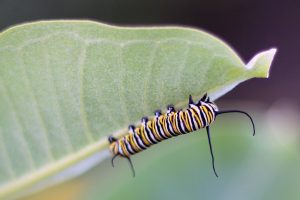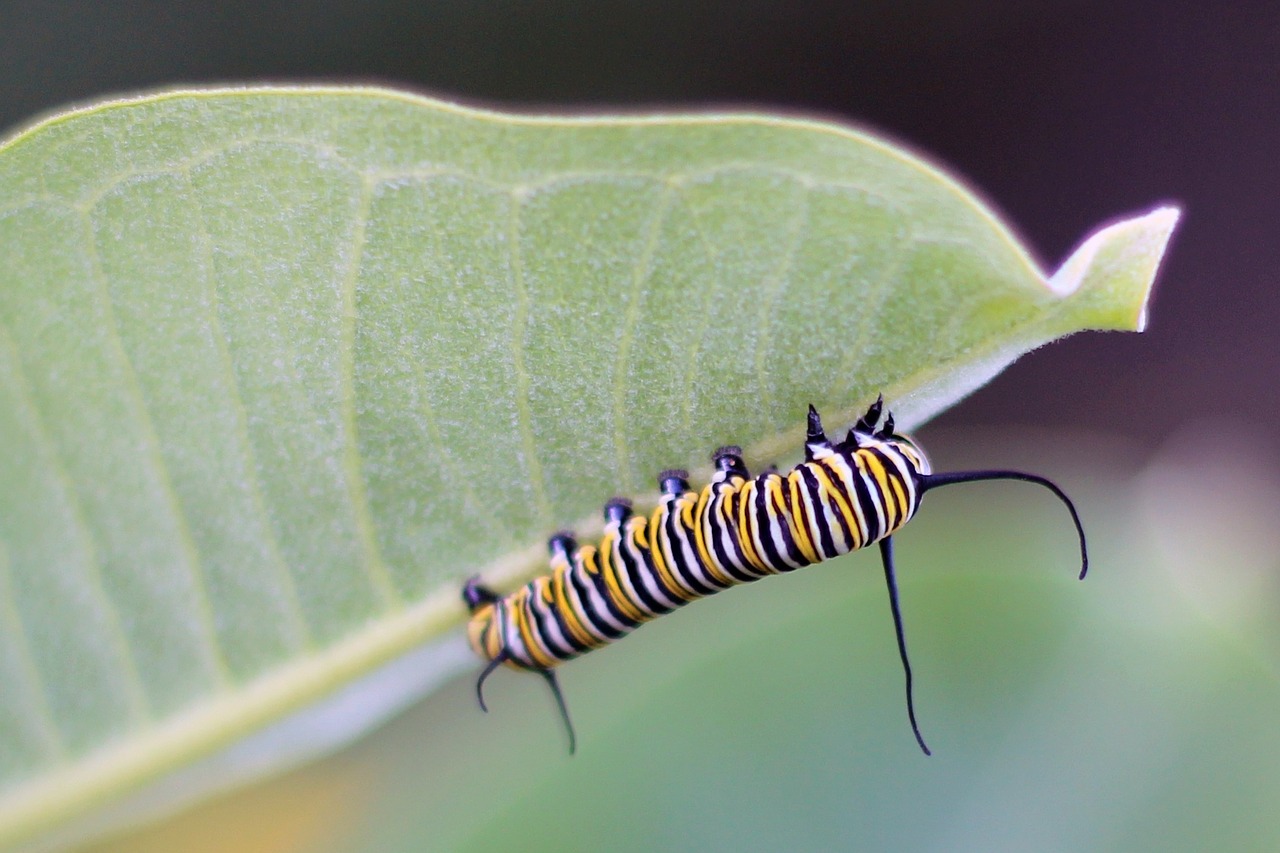Don’t let Milkweed Myths keep you from Supporting Monarch Habitat
 The following article was authored by the Keystone Monarch Collaborative, a diverse coalition of committed stakeholders – including scientists, conservationists, farmers, and the private sector – finding collaborative solutions to strengthen monarch populations and habitat. The original article can be found here.
The following article was authored by the Keystone Monarch Collaborative, a diverse coalition of committed stakeholders – including scientists, conservationists, farmers, and the private sector – finding collaborative solutions to strengthen monarch populations and habitat. The original article can be found here.
Populations of the monarch butterfly remain low. The population east of the Rocky Mountains, which overwinters in Mexico, fell 53 percent from the previous year’s count. Those west of the Rockies, which overwinter in California, tallied in near last year’s record low just over 29,000 individuals.
Habitat loss, particularly the loss of milkweed plants, which are the only plants on which monarch caterpillars feed, is one factor contributing to the monarch’s decline. Planting milkweed in yards, prairies, and field edges is an easy way to help monarchs. However, myths and misconceptions keep some people from helping monarchs in this way. Let’s set these myths straight so you can feel comfortable taking this important step to help monarchs.
- Milkweed is not an invasive weed. Common milkweed and most other milkweed species found throughout the United States are native, beneficial wildflowers. It is listed by neither the United States, nor by any state, as a noxious weed. Since there are many species, make sure to choose species native to your region. Farmers for Monarchs, an initiative of the Keystone Monarch Collaborative, has state-specific planting online resources available, like free or subsidized seed, technical assistance, and links to state and federal cost-share programs.
- Milkweed is not dangerous to livestock, pets or children. Milkweeds do contain trace amounts of a toxin called cardenolides, and animals must consume large quantities for it to be toxic. As long as forage is available, animals will not be inclined to eat milkweed. Milkweed also has a foul taste, making it unlikely that children will want to eat. Proper instruction about milkweed should be given to avoid accidental ingestion.
- Monarchs are not the only species to benefit from milkweed. There are many species that eat milkweed leaves or seeds, like milkweed beetles, large milkweed bugs, and tussock moths. Predators, such as crab spiders, mantises, and tree frogs prey on the many insect species that frequent and depend upon milkweed.
These are only a few of the misconceptions about milkweed. As more landowners and farmers commit to restoring pollinator habitat, we encourage them to look beyond the myth, learn the benefits, and support pollinators like the monarch butterfly.
As more landowners and farmers commit to restoring pollinator habitat, we encourage them to look beyond the myth and learn the many benefits of planting milkweed. The Keystone Monarch Collaborative and Monarch Joint Venture – a partnership of organizations working to protect monarch migration – offer more resources on milkweed myths and restoring pollinator habitat on their websites.


 Effective March 1, 2025, Thomas J. Vilsack, former United States Secretary of Agriculture and Governor of Iowa, became the first Chief Executive Officer for the World Food Prize Foundation. In this new role, Governor Vilsack is focusing on expanding the Foundation’s global network, and will further position the Foundation as a leader in addressing global food and nutrition insecurity, continuing his lifetime of public service.
Effective March 1, 2025, Thomas J. Vilsack, former United States Secretary of Agriculture and Governor of Iowa, became the first Chief Executive Officer for the World Food Prize Foundation. In this new role, Governor Vilsack is focusing on expanding the Foundation’s global network, and will further position the Foundation as a leader in addressing global food and nutrition insecurity, continuing his lifetime of public service. Shelby Coffey III is a distinguished journalist, media executive, and thought leader whose career has helped shape the landscape of American news and public discourse. Over several decades, Coffey has held some of the most influential roles in journalism, including serving as editor of the Los Angeles Times, executive vice president of ABC News, and deputy managing editor of The Washington Post. His editorial leadership extended to key roles as president of CNN Financial News, editor of the Dallas Times Herald, and U.S. News & World Report.
Shelby Coffey III is a distinguished journalist, media executive, and thought leader whose career has helped shape the landscape of American news and public discourse. Over several decades, Coffey has held some of the most influential roles in journalism, including serving as editor of the Los Angeles Times, executive vice president of ABC News, and deputy managing editor of The Washington Post. His editorial leadership extended to key roles as president of CNN Financial News, editor of the Dallas Times Herald, and U.S. News & World Report. Jerry Steiner has spent 40 years involved in agriculture following growing up on a Wisconsin dairy farm. He began his career with Monsanto, in multiple business leadership roles. From 2003-2013 he served as a member of the Executive team, as the company’s Executive Vice President of Sustainability and Corporate Affairs. He led the company’s global Government, Public and Industry Affairs teams across the 70 countries where Monsanto conducts business. This experience got Jerry connected to the Keystones centers work in agriculture. Key among his responsibilities were shaping the company’s public policy and building partnerships aimed at helping farmers around the world produce more food, while conserving valuable resources like water and energy. Two unique partnership that developed under his leadership were drought tolerant corn with 5 African countries, CIMMYT and the Gates foundation, and a building a sustainable business model in Brazil with the value chain leading to significant multi-company investment and soybean varieties that can protected themselves.
Jerry Steiner has spent 40 years involved in agriculture following growing up on a Wisconsin dairy farm. He began his career with Monsanto, in multiple business leadership roles. From 2003-2013 he served as a member of the Executive team, as the company’s Executive Vice President of Sustainability and Corporate Affairs. He led the company’s global Government, Public and Industry Affairs teams across the 70 countries where Monsanto conducts business. This experience got Jerry connected to the Keystones centers work in agriculture. Key among his responsibilities were shaping the company’s public policy and building partnerships aimed at helping farmers around the world produce more food, while conserving valuable resources like water and energy. Two unique partnership that developed under his leadership were drought tolerant corn with 5 African countries, CIMMYT and the Gates foundation, and a building a sustainable business model in Brazil with the value chain leading to significant multi-company investment and soybean varieties that can protected themselves. Jennifer Morris is the Chief Executive Officer of The Nature Conservancy, leading a team of nearly 6,000 staff working in more than 80 countries and territories tackling the dual crises of the
Jennifer Morris is the Chief Executive Officer of The Nature Conservancy, leading a team of nearly 6,000 staff working in more than 80 countries and territories tackling the dual crises of the  Congressman Joe Neguse represents Colorado’s 2nd District in the U.S. House of Representatives. He was elected to his first term in November 2018, becoming the first Black Member of Congress in Colorado history. In December 2022, Rep. Neguse was elected by his colleagues to serve as Chair of the Democratic Policy and Communications Committee (DPCC), becoming the first Coloradan to serve in a senior elected leadership role in the House in over 85 years. He serves on the Natural Resources and Judiciary Committees, and was also appointed by House Minority Leader Hakeem Jeffries to serve as one of four Democrats on the prestigious Rules Committee. Rep. Neguse serves as Ranking Member on the House Subcommittee on Federal Lands, which he previously Chaired in the 117th Congress.
Congressman Joe Neguse represents Colorado’s 2nd District in the U.S. House of Representatives. He was elected to his first term in November 2018, becoming the first Black Member of Congress in Colorado history. In December 2022, Rep. Neguse was elected by his colleagues to serve as Chair of the Democratic Policy and Communications Committee (DPCC), becoming the first Coloradan to serve in a senior elected leadership role in the House in over 85 years. He serves on the Natural Resources and Judiciary Committees, and was also appointed by House Minority Leader Hakeem Jeffries to serve as one of four Democrats on the prestigious Rules Committee. Rep. Neguse serves as Ranking Member on the House Subcommittee on Federal Lands, which he previously Chaired in the 117th Congress. Llewellyn King was born in Southern Rhodesia, now Zimbabwe. He went into journalism as soon as he turned 16, stringing for Time magazine and United Press in Africa.
Llewellyn King was born in Southern Rhodesia, now Zimbabwe. He went into journalism as soon as he turned 16, stringing for Time magazine and United Press in Africa. Steven Williams is the Chief Executive Officer of PepsiCo North America, overseeing a more than $48 billion business that spans PepsiCo’s Foods and Beverage operating units. His leadership encompasses more than 125,000 associates and over 900 locations across the U.S. and Canada. Steven joined PepsiCo in 2001 as part of PepsiCo’s acquisition of the Quaker Oats Company, which he joined in 1997, and has held leadership positions of increased responsibility since.
Steven Williams is the Chief Executive Officer of PepsiCo North America, overseeing a more than $48 billion business that spans PepsiCo’s Foods and Beverage operating units. His leadership encompasses more than 125,000 associates and over 900 locations across the U.S. and Canada. Steven joined PepsiCo in 2001 as part of PepsiCo’s acquisition of the Quaker Oats Company, which he joined in 1997, and has held leadership positions of increased responsibility since.